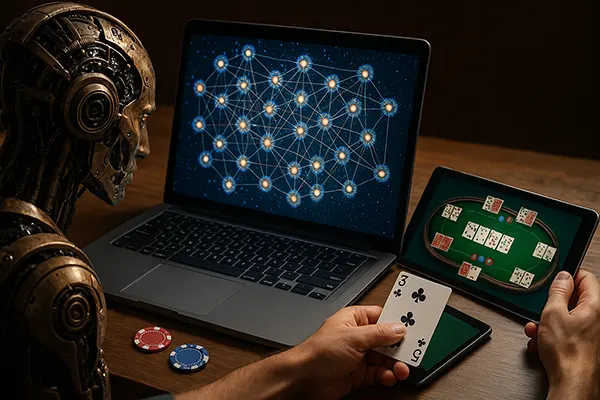
How Artificial Intelligence Is Changing Online Poker: New Challenges for Players
Artificial intelligence (AI) is becoming a powerful force in many industries, and online poker is no exception. With the growing integration of AI into gaming environments, players face new types of competition, emerging risks, and strategic adjustments. This article explores how AI is reshaping online poker as of February 2025, offering real insights and actionable knowledge for players who want to stay ahead.
Rise of AI Poker Bots and Their Impact on Gameplay
One of the most significant changes brought about by AI is the rise of poker bots—automated programs that can play poker at or above human professional levels. These bots use complex algorithms, game theory, and vast databases of poker hands to make decisions that are often more precise than those made by average players. In 2025, bot sophistication has reached a level where distinguishing between a human and AI opponent has become more difficult than ever.
Online poker platforms now face the immense challenge of maintaining a fair playing field. While most reputable sites employ advanced detection systems to monitor suspicious patterns, new bots are being programmed with “human-like” behaviours to bypass traditional anti-bot measures. For regular players, this creates a less predictable environment where it’s harder to rely solely on traditional tells and betting patterns.
For many players, this evolution means adapting to a more analytical and data-driven style of play. Being able to read opponents is no longer enough—modern players must now study hand histories, understand exploitative strategies, and even consider using legal AI tools themselves to remain competitive.
Legal and Ethical Dilemmas of AI in Poker
With AI’s presence growing in the poker world, so too are the legal and ethical questions surrounding its use. Should AI be completely banned, even if used for post-game analysis and training? What constitutes fair assistance versus an unfair advantage? As of 2025, most online poker operators define the use of real-time assistance tools during games as cheating, but there’s still a grey area when it comes to studying with AI off the table.
Regulatory bodies are working to clarify these boundaries. In Europe, for example, the European Gaming and Betting Association (EGBA) has published guidelines that encourage transparency and fairness, but enforcement varies by jurisdiction. Meanwhile, some smaller platforms still turn a blind eye to bot activity due to limited resources or differing policies, making it essential for players to choose trusted poker rooms.
Ethical players now face the added pressure of ensuring they stay within the rules while still leveraging the latest tools for improvement. Knowing where the line is drawn is crucial, especially as the temptation to “keep up” with AI-driven opponents becomes more intense.
AI as a Training Tool: Helping Humans Improve
While AI presents clear challenges, it also offers powerful opportunities for self-improvement. Platforms like PioSOLVER, GTO+ and Odin have become standard tools among serious players, offering game theory optimal (GTO) simulations and analysis. These tools allow players to identify mistakes, analyse optimal plays, and train with unmatched precision.
In 2025, newer AI tools go even further by adapting to a player’s own style, offering personalised feedback and session reports that highlight recurring leaks. This helps players not only learn GTO, but also build exploitative strategies tailored to specific opponents. The best AI software also comes with intuitive visual interfaces and mobile accessibility, making training more accessible than ever.
The democratisation of AI tools has led to a skill increase across the board. Casual players who dedicate time to learning with AI assistance can now compete at higher levels, narrowing the gap between amateurs and professionals. As a result, online poker is becoming more competitive and strategic, pushing players to continuously refine their approach.
Balancing AI Use Without Losing the Human Element
Even though AI can enhance gameplay and decision-making, there is a growing concern that it could also strip poker of its emotional and psychological richness. Part of what makes poker engaging is the interaction between personalities, the reading of emotional cues, and the mind games that play out between opponents.
Leading platforms are aware of this risk and are investing in preserving the human experience of the game. Some sites are testing new formats with webcam integration and real-time audio, while others offer AI-free “human-only” tables to keep the classic spirit of poker alive. The goal is to retain a balance between innovation and authenticity.
Ultimately, while AI may help players become technically stronger, it cannot fully replicate the thrill of outplaying a human mind in real-time. For many, maintaining that balance is the key to enjoying poker in this new AI-augmented landscape.

Security and Fair Play in the Age of AI
One of the primary concerns in 2025 is ensuring game integrity amidst the growing threat of unauthorised AI usage. Modern poker sites deploy sophisticated detection systems, including behavioural analysis, mouse tracking, and pattern recognition to flag accounts that may be using unfair assistance. However, as AI tools become more “human-like”, detection becomes increasingly complex.
To stay ahead, poker operators are now integrating AI-based detection systems of their own. These meta-AI tools analyse vast amounts of user behaviour data in real-time, comparing it to known human benchmarks. They also collaborate with cybersecurity firms and AI researchers to adapt faster than the bot developers.
Players also have a role to play in maintaining fair play. Reporting suspicious activity, using reputable poker clients, and avoiding shady platforms are all critical steps. As the battle between good and malicious AI continues, player awareness becomes a key component in sustaining a healthy poker ecosystem.
The Future Outlook: Adapting to an AI-Dominated Game
Looking ahead, AI will continue to evolve and redefine the nature of online poker. It’s likely that AI will become a permanent fixture, not only in backend security but also in player development tools and even live events. However, the community and regulators must remain vigilant to preserve fair competition.
We may also see the rise of AI-assisted tournaments, where players compete in formats that permit certain levels of AI collaboration. These could offer a new dimension of strategy and challenge, expanding the boundaries of what poker can be. Such innovation will require transparent rules and clear ethical guidelines.
For today’s players, the message is clear: adaptation is essential. Embracing AI as a learning tool, staying informed about fair play standards, and choosing trusted environments are all part of thriving in this new era of intelligent poker. The game is changing—but so can the players.
Popular
-
Casino transactions in 2026: chargeback, r...
When something goes wrong with a casino …

-
No-deposit casino bonuses: the restriction...
No-deposit bonuses can look straightforward: you register, …

-
No Deposit Bonuses: Conditions, Risks, and...
No deposit bonuses remain one of the …

